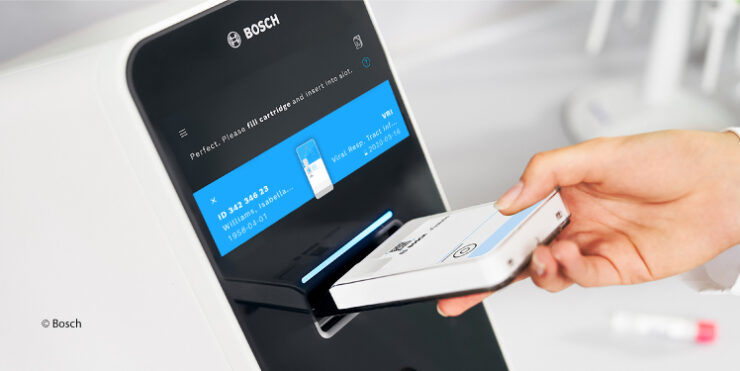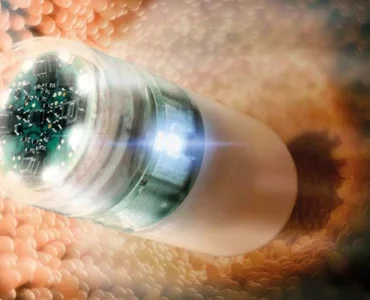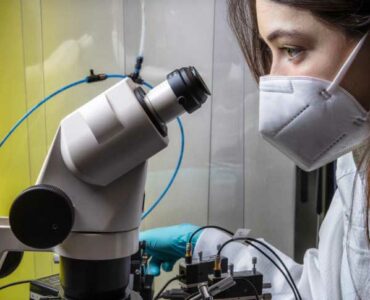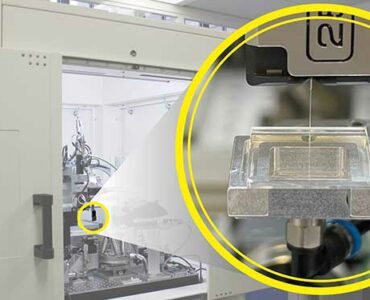The number of people infected with the novel SARS-CoV-2 virus is increasing at an alarming rate around the globe. According to data published by Johns Hopkins University, the virus has already affected 180 countries and been detected in the blood of more than 937 thousand people as of 2 April. In their efforts to arrest the spread of COVID-19, national and local governments everywhere have adopted tough measures to promote social distancing and are pushing research and development of medical technologies.
Fraunhofer IZM is monitoring the situation closely and will not stay on the side-lines while the world is battling this global problem. Our researchers are actively working towards solutions as a part of the Fraunhofer Gesellschaft´s joint efforts to assist the citizens and the society.
Today, RealIZM takes a look at the development of Bosch’s fast coronavirus testing technology, which is based on a PoC analysis platform developed together with Fraunhofer IZM. This was made possible in the CAJAL4EU project supported by the EU (funding code: FP7-ENIAC-120215) and BMBF (funding code: 13N10925) within the framework of FP7.
The introduction of fast-acting virus tests has been one of the few good news lately. Bosch has launched a test for COVID-19, which promises the result at the “point-of-care in less than 2.5 hours“ (https://www.bosch-healthcare.com/aktuelles/news/vivalytic-test-fuer-covid-19/). With previous tests, a person tested for the coronavirus had to wait for one or two days for the results to come back. The new quick test can drastically shorten that time, gaining an invaluable head start and helping the world’s fight against the coronavirus pandemic by significantly reducing the risk of the virus spreading undetected. This technical solution was developed in cooperation with the Northern Irish medical equipment manufacturer Randox Laboratories Ltd (https://www.randox.com/).
Vivalytic, the new test, uses a molecular diagnostic platform that is integrated into the test cartridge. To test a patient, a swab is taken from their nose or throat. The sample is placed in a cartridge that contains the reagents required for the device to conduct the actual test. One of the main advantages of the device is that no lab with specially trained medical personnel is required for the test. The entire test procedure is carried out on site, eliminating the need to ship the sample to a laboratory. Tested patients can also expect a quick result with more than 95 percent accuracy, covering not only the novel coronavirus, but nine other respiratory diseases such as influenza A and B. “The differential diagnosis also saves doctors time for further tests, quickly provides them with a well-founded diagnosis, and enables them to initiate suitable therapy more quickly”, as Marc Meier, Managing Director of Bosch Healthcare Solutions, explains. Bosch expects the tests to become available in Germany already in April; testing kits will also be available to clients fighting the spread of COVID-19 in other countries.
The technology underlying the test was developed in an EU project run by the ENIAC- EU consortium. 25 partners with a different background (industry and academia) from eight European countries where involved in the CAJAL4EU project. Their shared goal was to develop technologies and components for a lab-on-chip system with electrical detection capabilities, specifically a microfluidically integrated biosensor platform with an amperometric detection chip and the required software drivers to enable the early detection of hospital pathogens. The developed components were integrated into a complex technological solution and tested in demonstrators in order to prove the quality of integration, cost efficiency, and opportunities for biological applications. Fraunhofer IZM’s contribution was chip integration for both electronic, functionalized and passive-functionalized (subsequent fluorescence detection) chip components. The detection of pathogens in bloodstream infections was chosen as a use case, since the fast and effective identification of infections in the patient’s blood is essential for early targeted treatment. Unfortunately, the results of a 20 ml blood test (the current gold standard for bloodstream infections) are usually only available after one to six days. An analysis using genotyping with the lab-on-chip technology can drastically reduce the amount of biological samples needed and speed up the analysis. In the original project, streptococcus pneumonia was chosen as a target infection because of its clinical significance in bloodstream infections. The technology developed in the project was assessed carefully for its performance and the quality of the genotyping analysis. Convinced by design and by serendipity, Bosch had subsequently chosen the technology concept as the basis for its test platform and now for the new fast-acting COVID-19 test.
The joint project CAJAL4EU was realized in close collaboration with end users and the medical technology sector in a commitment to making an important contribution to Europe’s society and economy alike. The results of this research promise to be more than useful for other in-vitro diagnostic test manufacturers trying to provide reliable, user-friendly, and cost-effective tests in multi-parameter applications.
RealIZM wishes you and your loved ones all the best in these trying times. Stay safe!





Add comment